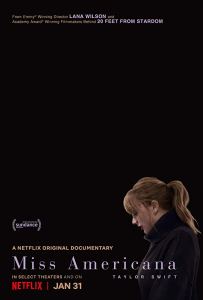Miss Americana
Premise: A look at iconic pop artist Taylor Swift during a transformational time in her life as she embraces her role as a singer/songwriter and harnesses the full power of her voice.
Celebrities: they’re just like us! They eat spicy burritos! They wear denim overalls! They spill their steaks when there’s turbulence on their private jets! It’s hard to go into Miss Americana if you’re not slurping up the Taylor Swift Kool-Aid (like myself) without at least some level of cynicism. It’s not that I dislike Swift or her music – I thoroughly enjoy both the song and music video for “You Need to Calm Down” – I’ve just always been very clearly outside her target demographic (plus I’ve fallen way out of touch with contemporary music in general, but that’s a discussion for another essay).
That cynicism permeates throughout much of the first third of Lana Wilson’s newest documentary, which serves essentially as a recap of Swift’s rise to fame and brushes with controversy, from her early awards dominance to the infamous hullabaloo with Kanye West at the VMA’s in 2009, and beyond. While these segments may help to familiarize the uninitiated, they don’t add much to the narrative, besides giving Swift’s side of the story – something that’s already been well established by now. The film takes almost every piece of news coverage or social media post as binary attacks or embraces of Swift, with hardly any gray area in-between. Interspersed throughout the film are glimpses of Swift and her producers and collaborators writing and rehearsing new music up to the launch of her 2019 album “Lover”. Swift mostly comes off as endearing in these moments, continuing to have a positive outlook despite all the darkness she’s faced throughout her career.
Where the documentary works best, and where I was left wishing it had focused more on, is Swift’s role as a positive influence to her fans. She reveals that she battled an eating disorder, constantly focusing on photos of herself and public opinion of her appearance before realizing that her worth was more than the size of her waist. One jaw-dropping moment in particular comes from a red carpet interview in which the questioner makes a comment that Swift could have her choice of men to take home at the end of the night because she looks so great. Swift’s reaction is the perfect combination of shock, outrage, and courteousness (she is on live TV, after all).
Swift’s narrative in Miss Americana significantly pivots after an accusation of sexual assault against a local radio DJ in 2017, and her renewed advocacy for women’s rights. Her arc from the beginning of the film as tight-lipped on social and political issues to an outspoken advocate for progressive issues is what makes the film worthwhile. Swift’s activism comes off as genuine without seeming too self-congratulatory as she crusades for Phil Bredesen in his campaign for Senator of Tennessee in the midterm elections of 2018, and later, for the Equality Act.
It’s this shift in thinking that mostly justifies the film’s existence, since the rest is already well-worn territory that could be boiled down to a puff piece on CBS’s Sunday Morning program. It’s initially frustrating that the only perspective seen is Swift’s, but the documentary is really her opportunity to reclaim her own narrative and block out the outside commentators. How much mileage you get out of Miss Americana may vary depending on your level of devotion to Swift’s career and music, but her overwhelming sincerity may make a believer out of even the most cynical.
About the Writer: Ben Sears is a life-long Indianapolis resident, husband, and father of two boys, as well as a contributing writer on ObsessiveViewer.com. Aside from watching movies and television, Ben enjoys photography (bensearsphotography.com) and running marathons, but never at the same time. That would be difficult.



